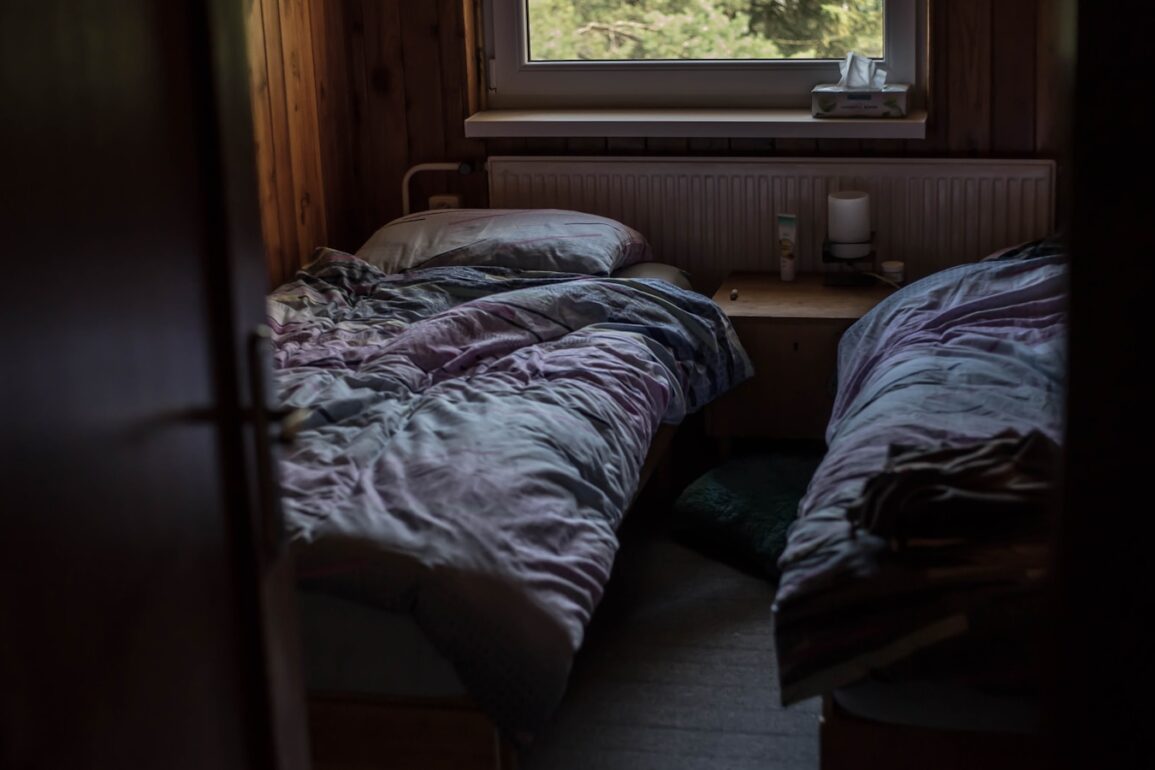Sleeping in separate beds might sound like the last chapter in a love story, but it could actually be a plot twist that saves the day.
Picture you and your partner, blissfully untangled from the bedsheets and the snoring symphony. It’s not a breakup; it’s a sleep divorce, and it’s a ticket to snoozeville that could bring back the spark in your relationship.
Let’s snuggle up to the idea that time apart at night might be just what you need to come together stronger by day.
And, if you’re curious about the nature of your relationship, check out our article about the different types of relationships and how to deal with them.
The Ins and Outs of Sleep Divorce
What if I told you that the secret to a happier relationship might just be a sleep divorce? It’s the unspoken nightly routine where lovebirds nest in separate beds.
Hackensack Meridian Health suggests it’s not about signing off on love but signing up for sleep quality.
Couples are drawing up their own sleep treaties, from separate blankets to separate rooms, all in the quest for undisturbed Zs. And it’s working!
Here’s the scoop from our own Sons Of Universe community members:
- Jeff from Austin shared, “My wife’s snoring could wake the neighbors. Since we started sleeping apart, we’re both more rested—and I don’t need earplugs!”
- Lisa in Seattle found that “Having my own space to think at night has been a game-changer for my mental health and our morning conversations.”
- And then there’s Sanjay from New York, who says, “Sleep divorce brought back the butterflies. We actually plan date nights now, and the anticipation is a thrill!”
These heartfelt testimonials from our own community members highlight that sleep divorce might just be the secret ingredient for a happier, healthier love life. It’s less about retreating to corners and more about finding the right sleep chemistry.
Divided We Sleep, United We Thrive?
The notion of separate bedrooms splits opinions like a night owl and an early bird sharing a worm.
The Healthy touches on this bedroom brouhaha, revealing how some see it as a step towards a stronger union, while others view it as a silent alarm for relationship woes.
Advocates cheer for the undisturbed shut-eye and the ‘I woke up like this’ glow, while skeptics whisper about lost intimacy and cold feet, both figuratively and literally.
It’s a tug-of-war between personal comfort and the warm fuzzies of a shared bed, with society’s blanket expectations covering it all.
The Sleepy Secret to Marital Bliss: 8 Unexpected Perks

When you hear “sleeping in separate beds,” you might think of a sitcom scenario where one partner is banished to the couch after a spat.
But hold on to your pajamas, because there’s a sleepy secret that might just sprinkle fairy dust on your marriage.
Here’s the lowdown on why catching your Zs solo could mean more we-time during the day:
1. Stress Less, Love More
It’s a simple equation. Better sleep equals less stress, and less stress equals a happier you.
When you’re not engaging in nightly tug-of-wars or resenting your partner’s late-night scrolling, you’re banking on good vibes that carry over into your relationship.
2. Personal Space for Personal Growth
Remember when you had room to stretch out and hog all the pillows? That can be every night.
Your own sleep space means room to grow, quite literally. It’s about having the freedom to flop, flail, or starfish to your heart’s content.
3. Me Time Turns to We Time
When you’re not battling over the blankets, that ‘me time’ at night becomes quality ‘we time’ during the day.
You’re both better rested, less irritable, and more inclined to enjoy each other’s company.
4. Synchronized Snoring to Synchronized Smiles
Believe it or not, Scientific American reports couples carving out their own sleep niches often wake up on the right side of the bed.
When you’re not jostling for blanket real estate or being serenaded by snores, you wake up refreshed and ready to tackle the day together—with smiles.
5. Autonomy Is Attractive
Autonomy is the new sexy. Sleeping apart can boost your sense of independence, which, in turn, can make you more attractive to your partner.
It’s the allure of being your own person, even in a duo.
6. Health Is Wealth
Separate sleeping arrangements can be a boon for health.
If one partner has a condition like sleep apnea or restless legs syndrome, separate beds can mean the difference between a night spent tossing and a night of healing rest.
7. The Art of Missing
Absence makes the heart grow fonder, right? A little space at night can make the time you spend together even more cherished.
8. Room for Romance
Counterintuitive? Maybe. But with the pressure off to be all cuddly every night, you can plan for intimacy, making it more intentional and exciting.
So, before you balk at the idea of a sleep divorce, consider these unexpected perks. It might just be the nudge your marriage needs to go from groggy to glowing.
You may also like:
Wish to Remain Married? Never Say These 12 Things to Your Husband
12 Wise Tips to Fix a Crumbling Marriage That’s Falling Apart
What’s Fear Of Intimacy? Reasons, Where It Comes From & How To Overcome It
5 Warning Signs of a Sleep Divorce Backfire
Not all fairytales end with a sleep divorce leading to marital bliss. Sometimes, the plot twists in a way you didn’t see coming, and the dream of better sleep leads to a nightmare of emotional disconnect.
Here are five red flags that your sleep divorce might be doing more harm than good:
The Silent Treatment Starts at Sundown
If you’re using separate bedrooms to avoid conversations or to escape dealing with issues, it’s not a break—it’s a breakdown.
Communication is key in any relationship, and if the only thing you’re sharing is silence, it’s time to talk.
Learn more about the silent treatment and its dynamics.
From Cozy to Cold
It’s natural to crave your own space, but if the thought of slipping under the sheets together leaves you cold, it could signal a deeper issue.
Intimacy isn’t just about physical closeness; it’s about emotional connection too.
The Great Wall of Resentment
If one partner is feeling pushed out or if the arrangement wasn’t mutual, resentment can build faster than a fortress around your heart.
Make sure both parties are on board and see the separate beds as a solution, not an exile.
Lost in Translation
When you’re not ending the day together, it’s easy for gestures and intentions to get lost in translation.
What was meant as a kindness—giving your partner the gift of sleep—can be misread as indifference.
The Emotional Moat
Sleeping apart can sometimes widen the gap between hearts. If you find that the physical distance is creating an emotional moat that’s hard to bridge by day, it’s a sign to reassess.
Sleeping in separate beds can be a boon for some and a bane for others. Keep an eye out for these warning signs and remember: the goal is to enhance your relationship, not to create a chasm.
If you find the space between you growing too wide, it might be time to return to shared slumber or seek guidance to navigate these nighttime nuances.
What Americans Really Think About Sleeping Solo
You’re not alone if you’ve thought about solo slumber. A recent survey by the American Academy of Sleep Medicine revealed that one in three Americans would rather sleep by themselves.
This sleep trend is more than a blip on the radar; it’s a cultural shift. While some cultures have long embraced separate quarters for quality shut-eye, the typical American love nest has championed a shared bed.
But times are changing, and so are our sleeping arrangements, as more folks are tucking into the idea of sleeping apart for better rest.
A Psychological Perspective on Sleep Divorce
Psychologists are turning the nightlight on sleep divorce, revealing how it impacts our relationships.
It’s a tango between our attachment styles—secure, anxious, or avoidant—and our innate needs for closeness and independence. For those who cherish autonomy, a sleep divorce can be a dream come true, reinforcing a sense of self within the relationship.
Yet, for others, the physical separation can stir up feelings of anxiety and abandonment.
It’s about finding the sleep sweet spot that aligns with both partners’ psychological makeup, ensuring that a good night’s sleep doesn’t turn into emotional unrest.
What the Future Holds
As we tiptoe into the future, sleep divorce could redefine our nightly norms. Imagine smart homes with bedrooms that adapt to our sleep needs, or wearable tech that nudges us to separate spaces when our sleep patterns clash.
This isn’t just about two beds under one roof; it’s about a sleep revolution that honors our health and harmony.
The conversation is just getting started, and as we become more attuned to our well-being, sleep divorce might just be the next wellness frontier.
Making the Decision That’s Right for You
Deciding on a sleep divorce is like choosing the right mattress—it’s personal. Start with an open chat about your sleep needs and concerns.
Listen, really listen, to your partner’s bedtime blues. And if you decide to give it a go, keep the emotional connection alive with regular check-ins and cuddle time.
Remember, it’s not about sleeping apart; it’s about waking up to a relationship where both of you are well-rested and ready to connect.
Conclusion: Embrace the Night, Preserve the Light
Sleep divorce is a balancing act between solo snoozing and duo dozing. It can bring tranquility or turbulence to your twosome. If you’re contemplating separate beds, weigh the benefits of better sleep against the need for nighttime togetherness.
It’s about finding what fits your love story. As you ponder the possibilities, remember that whether you’re inches or rooms apart, it’s the quality of your connection that truly counts.
Have you and your partner ventured into the land of sleep divorce? Or are you snug as bugs in a shared bed? I’d love to hear your stories and thoughts. Drop a comment below and let’s chat about it.
FAQs
Is it healthy for couples to sleep in separate beds?
Absolutely, sleeping in separate beds can be a boon for a healthy relationship. It allows both partners to enjoy quality sleep without the disturbances that come from incompatible sleep schedules or conditions like obstructive sleep apnea. It’s all about personal spaces and sleep quality.
What percentage of married couples sleep in separate beds?
You might be surprised to know that a significant number of married couples embrace separate sleeping arrangements. While exact percentages can vary, it’s clear that lots of couples are finding solace in the idea of a sleep divorce to ensure a night of deep sleep and maintain a strong relationship.
What happens when couples stop sleeping together?
When couples stop sharing a bed, it can lead to an increase in individual mental health and sleep quality. However, it’s crucial to maintain emotional intimacy and sexual intimacy to prevent feelings of abandonment and ensure the relationship remains strong and connected.
Is it normal for couples to go to bed separately?
Absolutely, it’s normal for couples to have different bedtime routines, especially if one is a night owl and the other craves an early hour of sleep. Acknowledging these personal rhythms can actually contribute to a healthy sleep routine and a harmonious family house.
You may also like:




